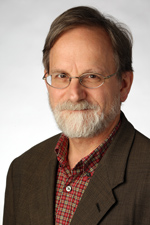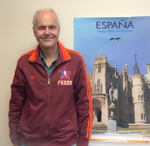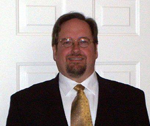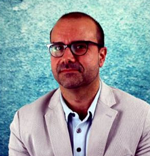 Keynote Speaker: Marshall Breeding
Keynote Speaker: Marshall Breeding
Session Time: 10:00 - 10:45 a.m. CDT
Session Title: Revolution and Evolution: Diverging Paths for Systems Development
Session Description: The current environment for library resource management systems and discovery services currently includes an interesting mix of products created through a diverse set of development strategies. In addition to the evolution of the longstanding integrated library system, a new genre of products, library services platforms, have emerged which embrace a substantially different set of workflows with distinct technology characteristics. It is a realm offering products based on either open source or proprietary software. Strategies also differ regarding discovery, with some providers preferring to bundle discovery with their resource management product and others promoting a mix and match approach. Breeding will present an overview of this menu of options their relative merits or challenges.
Speaker Bio: Since 1985 Marshall Breeding has provided consulting services to various individuals and organizations. He specializes in the alignment of technology with strategic organizational priorities. From 2000-2012 he was Director for Innovative Technologies and Research at the Jean and Alexander Heard Library, Vanderbilt University.
 Speaker: Ken Chad
Speaker: Ken Chad
Session Time: 11:00 - 11:45 a.m. CDT
Session Title: Will Platform Businesses Eat Library Systems?
Session Description: "Are platform businesses eating the world?" is the title of a February, 2016 Forbes magazine book review by Brooke Manville. The phrase is a new take by authors of the book "The platform revolution" on the phrase "software is eating the world," that was coined by venture investor Marc Andreessen.
Library services platform (LSP) is the phrase conceived by Marshall Breeding a few years back ago to describe a new generation of systems that are replacing the old ILS. Was Marshall right? Are these new systems really "platforms"? This presentation argues that we still may have a way to go before even "next generation" systems can be properly labeled "platforms". I will define the platform approach and the benefits it could bring by putting it into the context of library technology and will suggest how things might work.
Speaker Bio: Ken gained his MA from the Information Science Department at City University in London and is analumnus of the Warwick University Business Innovation and Growth. Ken has over 20 years’ experience in the library software business working in support, project management, implementation, sales, marketing and upper management. He has worked with all types of libraries from across the UK and throughout the world.
Ken established and manages a number of open community resources for library technology, including Higher Education Library Technology (HELibTech), Local Government Library Technology (LGLibTech) and Open requirements for library systems (LibTechRFP). Ken serves on several committees and advisory boards including the NISO Open Discovery Initiative (ODI).
Since 2007, Ken’s consulting business, Ken Chad Consulting LTD, has worked with individual libraries, archives, non-profits and businesses. He works on innovating new products and services for the library sector. Much of his focus is on needs analysis and user experience, market reviews, preparing requirements and business cases to enable libraries to be fully prepared as they go to market for new solutions. He has published articles and library technology briefing papers and presented at major conferences around the world.
 Speakers: Sever Bordeianu and Laura Kohl
Speakers: Sever Bordeianu and Laura Kohl
Session Time: 11:00 - 11:45 a.m. CDT
Session Title: Migrating the ILS: The University of New Mexico’s Adoption of WMS
Session Description: ILSs are evolving. Cloud-computing is causing a major shift in the way organizations manage their data. For libraries this shift entails the switch from stand-alone ILSs to cloud-based systems. The new generation of ILSs embraces this model. The University of New Mexico Libraries undertook the migration to OCLC's cloud-based ILS, WorldShare Management Services (WMS). The process required preparing the data for migration, performing the migrating of the data to the new system, testing the results, and implementing new workflows. This presentation will look at each of these stages of the migration and describe the process along the way.
Speaker Bio: Professor Sever Bordeianu has a Master’s in Library and Information Science from the University of Texas at Austin, and an MA in Philosophy and German Literature from the University of Mississippi. He has worked in Reference and Cataloging at the University of Michigan (1985-87), UC Irvine (1987-89), and UNM 1989 to present. He is currently Director of Technical Services and Outreach Librarian for Philosophy/Religion, Foreign Languages, and English.
 Speaker Bio: Laura Kohl is a Cataloger at the University of New Mexico’s College of University Libraries and Learning Sciences. She earned her Master’s in Library and Information Science from the University of Pittsburgh. Prior to working at UNM, Laura was a Cataloger and Archivist for the New Mexico History Museum’s Fray Angelico Chavez History Library in Santa Fe. She was the lead cataloger for the Historic Maps of New Mexico Project supported by the Council on Library and Information Resources and the Andrew W. Mellon Foundation, through their Cataloging Hidden Special Collections and Archives program. Her experience includes the cataloging of special collection material, PCC and NACO cataloging, archival processing and encoding, collection management and library and archival preservation.
Speaker Bio: Laura Kohl is a Cataloger at the University of New Mexico’s College of University Libraries and Learning Sciences. She earned her Master’s in Library and Information Science from the University of Pittsburgh. Prior to working at UNM, Laura was a Cataloger and Archivist for the New Mexico History Museum’s Fray Angelico Chavez History Library in Santa Fe. She was the lead cataloger for the Historic Maps of New Mexico Project supported by the Council on Library and Information Resources and the Andrew W. Mellon Foundation, through their Cataloging Hidden Special Collections and Archives program. Her experience includes the cataloging of special collection material, PCC and NACO cataloging, archival processing and encoding, collection management and library and archival preservation.
 Speaker: John McCullough
Speaker: John McCullough
Session Time: 1:00 - 1:45 p.m. CDT
Session Title: OCLC WorldShare Management Services: Reimagined Library Management in the Cloud and at Webscale
Session Description: Together with a library advisory council and pilot libraries, OCLC pioneered the move of library services to the cloud and to webscale with OCLC WorldShare Management Services (WMS). The vision of WMS was to create a next-generation library services platform that empowers libraries to be more efficient through sharing data, work and infrastructure—all at scale. OCLC built WMS based on libraries’ input and now we’re partnering with the 500 libraries that selected WMS as we develop it into the future.
Speaker Bio: John McCullough is Senior Product Manager for Management Services at OCLC. He is responsible for the ongoing development of WorldShare Management Services and WorldShare License Manager. Prior to joining OCLC, he was the Vice President of Product Management at Innovative Interfaces. John has nearly 20 years of experience with libraries and library automation. He has extensive experience with library-driven product development, product management and the design of interfaces for library staff and end users. He earned a MLIS at the University of Western Ontario and a BA at Wilfrid Laurier University.
Speakers: Eric Keith and Justin Swain
Session Time: 1:00 - 1:45 p.m. CDT
Session Title: The Future is in the Cloud
Session Description: In recent span of library technology there are two major solutions that are proving to be game-changing for the industry: cloud services and Linked Data. Cloud hosting is changing the nature of libraries internally, as well as changing the nature of data security and accessibility. Linked Data is still a young technology; vendors and libraries are still in the process of learning how catalog open-web visibility will impact both libraries and search engines. In this presentation on the two solutions driving change in the library industry, SirsiDynix technologists Eric Keith and Justin Swain will discuss the current role and expectations for the future of cloud services and Linked Data.
Speaker Bio: Eric is the Vice President of Global Marketing and Business Development for SirsiDynix. He oversees corporate communications, media relations, and strategic partnerships.
Speaker Bio: Justin is the product manager for BLUEcloud Visibility, the solution that incorporates Linked Data and BIBFRAME to bring library catalogs to the open web.
 Speaker: Scott Piepenburg
Speaker: Scott Piepenburg
Session Time: 2:00 - 2:45 p.m. CDT
Session Title: It's All About the Data
(NOTE: this session will not be recorded)
Session Description: Library systems are becoming more sophisticated and able to bring together information resources from many points. The information about what we own is just as important as the information about non-physical resources. While the venerable AACR2, MARC and RDA have served us well in the ILS world, the data becomes even more critical in a discovery, linked data environment. Learn some painless yet effective ways to make your library's metadata more useful and accessible.
Speaker Bio: Scott Piepenburg is currently Head of Cataloging at Valdosta State University in Valdosta Georgia. His prior experience includes the position of Cataloging Coordinator at the University of Wisconsin—Stevens Point and District Cataloger/System Administrator for the Dallas Independent School District where he was instrumental in bringing up the initial DALLINK project, the first large-urban union catalog in the United States. His work experience includes work at Hampton University, a HBCU in Virginia as well as Vincennes University in Indiana. Not limited to only working in libraries, he has worked at such vendors as EBSCO, Infotrieve, and Follett Software, being one of the developers of the original Alliance+ product and the Unison software product which served as the basis for the current Destiny product.
 Speaker: M Ryan Hess
Speaker: M Ryan Hess
Session Time: 2:00 - 2:45 p.m. CDT
Session Title: ILS Disruption: AI, VR and the Blockchain
Session Description: Once again, the library paradigm will be upended as a new wave of technologies arrive. Artificial Intelligence is already altering the ways people interact with and query information.
Early forms of Virtual Reality are just becoming available to the public but will upend the ways people work, socialize and experience information. The Blockchain, the technology behind digital currencies like Bitcoin, has the potential of altering the way any transaction is handled. Each of these has the potential to disrupt the way libraries do business and will likely impact the future of ILS technologies. In this talk, we will explore the current state of AI, VR and the Blockchain and consider how they will alter the touch points between the ILS and our users.
Speaker Bio: M Ryan Hess is Senior Librarian for Information Technology at the Palo Alto City Library, responsible for supporting and developing the Library eBranch and website. Prior to Palo Alto, he was the Digital Services Coordinator at DePaul University Library, responsible for digital and web strategies. Ryan also worked for Adobe Systems synthesizing and delivering market research.
 Speaker: John Sandstrom
Speaker: John Sandstrom
Session Time: 3:00 - 3:45 p.m. CDT
Session Title: ILS or LSP: What are we Moving Towards?
Session Description: First there were computers to print card catalog cards. Then there were online cataloging systems. These added On-line Public Access Catalogs (OPACs)and a time when each functional area of the library would have a computer system from a different vendor that may or may not talk to each other. From here we moved t the Integrated Library System (ILS). Now, With the integration of the Internet and cloud computing into library services, we are in transition again to the Library Services Platform (LSP). What exactly is the LSP? How does it differ from an ILS?
Speaker Bio: John Sandstrom has over 25 years of experience in academic, public, and special libraries. He is currently an Associate Professor and Acquisitions Librarian at New Mexico State University, as well as teaching for the Library Associate degree program at Dona Ana Community College.
John recently served on the New Mexico State University Library Task Force writing the RFP for their new ILS/LSP. He is looking forward to sharing what he learned about reimagining the ILS and moving towards the Library Services Platform (LSP).
 Speaker: Josh Petrusa
Speaker: Josh Petrusa
Session Time: 3:00 - 3:45 p.m. CDT
Session Title: Anything Can Happen in the Zone: Library and Departmental Change Driven by Migration to a Cloud-Based Library Management System
Session Description: Butler University Libraries had already made progressive changes in public services areas, but Technical Services remained unchanged and bound to legacy practices from decades past. For us, the best catalyst for change was a system migration to a cloud-based type of library management system. This system migration was tied to organizational restructuring and a new strategic plan, each of which intertwined with the details of the migration project and was underpinned by thoughtful analysis of how to help employees through change. Earlier research on technical services departments is discussed in light of how technical services roles will change through the adoption of streamlined workflows available in a cloud-based ILS, and how the change can help refocus a library’s efforts to fulfill its evolving mission. Details of the migration will be discussed in relation to how they inspired departmental and organizational change through updated technology.
Speaker Bio: Josh Petrusa is presently the Associate Dean for Collecitons & Digital Services at Butler University since 2010. He previously worked at Norwich University in Northfield, Vermont and DePaul Univeristy in Chicago. A proud Chicagoan, he now grudgingly admits Indianapolis is steadily improving as a city, though he still struggles to understand the locals' yearly fascination with auto racing.





